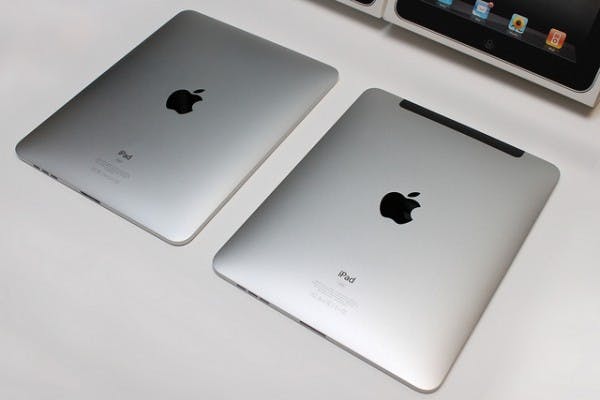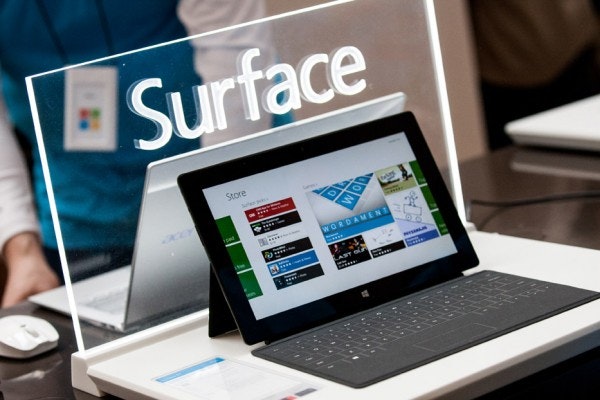Tablets are the new norm. The mere mention of tablet computing will, in most, elicit the knee-jerk reaction of praise for
Apple Inc. (NASDAQ:AAPL)’s iPad. Since the launch of the first version in 2010, the domination of the tablet market has been largely based on the hitherto unmatched combination of cost-effectiveness and high functionality.

Companies such as Google Inc. (NASDAQ:GOOG) and Microsoft Corporation (NASDAQ:MSFT) have launched their own products, and are furiously trying to set the new standard for tablet computing. While I see this as beneficial for both, I believe Apple will continue to stay ahead because of the superiority of the product, and its culture of creativity and innovation.
Apple’s world
Tablet computing success is threatening to sink the PC market. It is expected that the sales of tablets will reach 375 million in the next three years, a compound annual growth rate of about 46%. A report from market researcher Forrester Research states that there will be 760 million tablets in use by 2016. Over the next few years, tablets will only increase in features, processing power, and better wireless capabilities, which could, in turn, allow for options like full voice control, better accessory integration, and software that “anticipates a user’s needs.”
Apple Inc. (NASDAQ:AAPL) did much of the work popularizing the concept and how a tablet can improve your life. It also set the standard in weight, size, and dimension, as seen by the fact that many tablets announced or released since the iPad look almost exactly like it.
Competitor number one: Intel Corporation (NASDAQ:INTC)’s Ultrabook. The company began to play with a laptop-tablet hybrid concept, and even showed off a sample unit to prove its case. However, the focus was more on its latest high-performance Ivy Bridge processors. With recent acknowledgement by Hewlett-Packard Company (NYSE:HPQ) that it will use the quad-core processor in two of its all in one desktop models, the promotion of the chip seemed to be the only thing news-worthy to come out of the launch.
For HP, recent movement has been eye-raising as investors saw its stock pop over 10% in a single day last week on a big earnings beat – and this despite a drop in profits and revenue. HP posted results of $0.82
EPS, versus $0.92 from the same quarter last year, and the stock now trades over 50% its average Wall Street price target.
As for Intel, it gained a record market share of 16.5% last year, once again beating competitors QUALCOMM, Inc. (NASDAQ:QCOM) and NVIDIA Corporation (NASDAQ:NVDA). However, owing to unfavorable trends, namely the growing dominance of smartphones & tablets and a slowdown in global PC shipments, Intel’s stock has been facing downward pressure. Peaking at $29 less than a year ago, the stock has declined almost 32% since then. It now sits just over $21 with a market cap lower than that of Qualcomm.
The second notable adversary was Google’s Nexus. To be fair, the Nexus was delivered at nearly the same time as Google Inc. (NASDAQ:GOOG) was pushing it’s Chromebook – same elements in laptop form. Android has long struggled with its need for more tablet-optimized apps. Still with an excellent design, good battery life, and low starting price, the Nexus 7 is an inexpensive way to experience the best of the tablet world without breaking the bank.
Its tablet has contributed in no small part to an impressive stock performance. Some analysts are eyeing the $1000 per share mark for next year. A 15% move for the market across the next 20 months is very possible, given the 13% move in calendar 2012. In addition, this month, Deutsche Bank reiterated its “buy” rating on Google and upped its target to $935. RBC also kept Google at “outperform” and set a 12-month target of $950.
While it must be stated that there is the risk of buying at the top after this run. But Google Inc. (NASDAQ:GOOG) crested at $844 just a few weeks ago, and has seen a 5% pullback from that 52-week high, so this might be your opportunity to get in
Most recently, Microsoft Corporation (NASDAQ:MSFT) launched its new Surface Pro.

This seems to have more resources (i.e. money) put into the marketing strategy than the actual device. The Microsoft Surface Pro is very sleek in appearance, and packs a decent punch in the compact 10-inch tablet. It has a very clean, crisp design and sharp 1080p screen, along with a Type and Touch interface.
Microsoft Corporation (NASDAQ:MSFT) appears to be banking on its Windows 8 mobile operating system to pursue market share in the mobile arena. The more devices that use Windows 8 (whether built by Microsoft or not) is still a revenue source for it, and a foothold for later capitalization. From a valuation standpoint, Microsoft trades on the cheap side, with an 18% 5-year expected
EPS growth rate. This is on top of its 10x PE ratio, which is near the low end of its 5-year historical range of 9-18 times, so I think Microsoft could well be worth taking a look at.
Summary
The main fight is against Apple’s efficiency. With iTunes and the ability for users to purchase music, movies, TV shows, and educational content, Apple Inc. (NASDAQ:AAPL) is giving its customers a one-stop shop. Buy, download, sync, and take everything with you. If one adds the App Store to that equation, Apple is the epitome of convenience.
Apple’s stock has not been all roses. Shares hit a 52-week low of $419 on March 4, more than 40% below the all-time high it hit in September. But Apple has come roaring back in the past few weeks. The stock is now trading around $455, up nearly 10% from the March 4 low. I believe it will continue this upward trajectory as tablet sales steadily rise. I also see stocks positively reacting to growth in sales for both Microsoft Corporation (NASDAQ:MSFT) and Google.
The article Apple Poised to Ride Tablet Market Higher originally appeared on Fool.com and is written by Maxwell Fisher.
Copyright © 1995 – 2013 The Motley Fool, LLC. All rights reserved. The Motley Fool has a disclosure policy.



